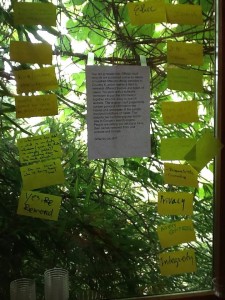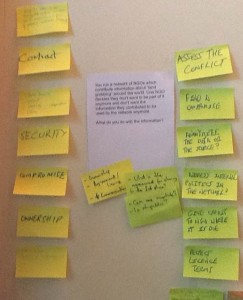Thank you to TechSoup for inviting me to participate the Net Tuesday panel all about Open Data. I’ve collected some discussed reasons for and against Open Data, plus provided a resource list on privacy and security research into data sharing. During the chat, we also dug into the roots of ‘data owners’ and ‘consumers’. I think we need to talk about some barriers in models and organizations, before we can ask folks to be more open.
In Service….
It was mentioned at the event that some non-profits workers have bias: Citizens who ‘consume’ their services don’t have the ability to measure, give context or give feedback with the level of comprehension or respect required. For me this was a culture shock moment, I asked back:
“what is the mission and why are people so removed from whom they are supposed to be serving”.
Enabling citizen voices is a huge theme in my open career. The idea that a ‘citizen’ as a ‘widget’ and not a participant in this journey is archaic. This model or perception that a ‘citizen’ is only a ‘consumer’ of some product of an ‘non-profit’ or ‘non-governmental organization’ is shocking. Who are we serving? It sounds like a case of the brand coming before the mission. This is why I am a passionate about Open Knowledge via OKF, an Ushahidian fangirl and increasingly excited about projects like Feedback Labs. I think that open data is part of that journey of leveling the field and making it a conversation with participants. Simply put: citizens can and should be the participant, community, the partner, the funder, and the data owner/remixer.
There was a great blog about leadership and humility posted to the Harvard Business Review. (I think it applies to our work.) We need to have some humility and honour those we serve.
@HeatherLeson challenges us to get our community involved on our data sharing projects. What small and big asks can we make? #net2to
— TechSoup Canada (@techsoupcanada) September 10, 2013
When we think about the way forward for small budgeted non-profits and how they can take advantage of open data and even share their data, it means other changes in how we work. Every organization has the ability to build their own open data community helpers. This means building a plan to find and on board these types of participants. It is a knowledge gift.
Why Non-profits won’t share
Bill Morris (211ontario.ca) shared thoughts on what are some of the barriers & responses to sharing Open Data.
- Competition
- Complicate data structures
- What’s in it for me? What is the Value to a NFP to share data
- Turf
- Time, resources and focus
- Perceived ownership
- Licenses
- risk of privacy and security issues
Our list of why to share
- Use the best collective brainpower
- Avoid duplication of effort
- Cross-check your assumptions, bias
- Obtain complimentary datasets to provide nuance
- Identify gaps
- more info could help with better decision making
- tell the story
(And, of course, all the beautiful items like – inclusive, transparent and accountable.)
(NOTE: I purposely did not review the Sunlight Foundation list until after the event so cross-check our thoughts. See the Reasons not to release data gdoc.)
Thinking about Privacy and Security with datasets
For the past few months, I’ve been working on Data Cleaning Guidelines for the Ushahidi Community. At Info Activism Camp I was able to get some help testing my assumptions with folks from Datakind and OKFN. Then, I reviewed the following documents to help consider what recommendations we should collectively give citizen mappers:
Standby Task Force: Data Protection Standards 2.0
ICT4Peace – The potential and Challenges of Open Data for Crisis Information Management and Aid Efficiency
Oxfam: Evolution of Protection of Civilians in Armed Conflict
UNOCHA – Humanitarianism in a Network Age
ICRC: Professional Standards for Protection Work Carried out by Humanitarian and Human Rights actors in armed conflict and other situations of violence. This list really struck me as a way to consider what types of data we can share.
- Necessity & capacity
- Data protection laws
- Do no harm
- Bias/non-discrimination (objective information/processing)
- Quality check/reliability
(This was my third time at a Net Tuesday speaking. They are fantastic growing community. I hope my notes are helpful.)


